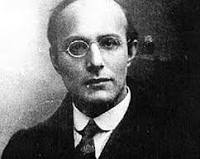When I showed When the People Awake to an undergraduate class in the mid-70s, the militant documentary received a strongly favourable response. It had been made in 1972 by left-wing Chilean film-makers who supported the democratic-socialist administration of Salvador Allende’s Unidad Popular. When I screened the same stirring documentary in the same course 25 years later, the students responded negatively. In fact, they voted with their feet, most of them withdrawing from the classroom under the cover of dark. What had changed in the interim? Continue reading
Category Archives: ideology-and-vision
A New Vision for the Left I: Legacy
Tolstoy observed that there are only two essential questions: how shall we live, and what should be done? A vision effectively answers these two questions.
But the left’s vision is no longer as compelling as it once was. The failures of socialist and social-democratic movements in the 20th century and new challenges in the 21st century demand a rethinking. The absence of a compelling and viable worldview has allowed far-right, populist movements to step into the breach and make headway everywhere.
Is Donald Trump a Fascist?
Fascism is much in the news. In Central and Eastern Europe, Russia, Turkey and elsewhere, we read reports of the rise of right-wing nationalist-populism, while, in the Middle East, “Islamo-fascism” is blamed for vicious and unending wars. In the United States, Donald Trump is now routinely dismissed as a #fascist. Is the US falling into the same deadly pattern so evident elsewhere? Continue reading
Learning to Dance with My Lectern
I started blogging a couple of years ago because I felt passionately about a particular topic – rejuvenation of the democratic left – and felt I had something useful to say.
But, as a blogger, my greatest handicap was my life’s work as a lecturer. I’ve come to realize that, to succeed, I need to spurn the lectern or at least learn to dance with it. Continue reading
Is Canada’s ‘Leap Manifesto’ Too Radical?
The press attacks on the LeapManifesto when it was considered by the New Democratic Party piqued my interest. “A Hard Left Turn to Nowhere,” thundered the National Post. Barrie McKenna of the Globe & Mail proclaimed that “The Leap Manifesto is a Prescription for Ruin.” Macleans lamented “How to Kill the NDP.” Some columnists concluded that the “loony left” had captured the party (even though the party had not endorsed the manifesto). What is all the fuss about? Continue reading
Why Identify with Left-Wing Politics?
“A young person who isn’t a socialist hasn’t got a heart; an old person who is a socialist hasn’t got a head.” Is this true?
This old adage suggests that an attachment to the left is merely a romantic and naïve phase that should eventually pass as we mature and gain a more “realistic” understanding. Realism from this viewpoint involves the acceptance that There is No Alternative (TINA) to presently-existing capitalism and liberal democracy, that the most we can expect is some minor tinkering.
But this conservative viewpoint is unconvincing for two reasons. Continue reading
Pursuing a Passion for the Possible
Albert Hirschman’s challenge to social scientists in A Bias for Hope (1971) to embrace a “passion for the possible” has largely been ignored in the mainstream disciplines. That is a pity for, in this age of high anxiety and disaffection, don’t we desperately need perspectives that transcend the limiting confines of liberal democracy and the commodification of everything? Continue reading
Interview with Richard Sandbrook on Reinventing the Left

Ali Burak Guven (ABG): What was your motivation for writing Reinventing the Left?
To be honest, I never set out to write such an ambitious book. I originally conceived the project as a critique of neoliberal development doctrine. But one thing led to another, and my inclination to move beyond critique to the central question of “what might be done” came to the fore. This, to my mind, raised the issue of the viability and promise of the democratic left. Continue reading
The Democratic Critique of Neoliberalism
This interesting reflection by William Davies assesses the contention that neo-liberalism, that much abused term, refers (using Karl Polanyi’s terms) to the highest stage of disembedding the economy from society. According to this view, homo economicus now reigns supreme in a national society and world in which economic calculations, especially the financial return on investments, are the only rational basis for decision-making in all spheres, including the university. With people reduced to human capital, nature to natural capital, knowledge to intellectual property and money to financial capital, society is fully subservient to the logic of the market. But, if this is the doctrine of neo-liberalism, is it also the existential reality? No, because the neoliberal vision is an utopian as the earlier liberal vision. A sustained effort to attain the vision will devastate human institutions and nature, leading to unpredictable and possibly deadly protective movements.

Why Polanyi and Not Marx?
A recent Marxist critique of Karl Polanyi’s theoretical approach concludes that there is nothing wrong with the latter that cannot be remedied by a major infusion of key Marxist concepts. Benjamin Selwyn and Satoshi Miyamura in their 2014 New Political Economy article display an impressive grasp of Polanyian as well as Marxist categories. Yet, in their critique, they never consider why Polanyi, who was both knowledgeable of, and sympathetic to, Marxism in his early and middle years, eventually broke with Marxism to forge his own analytical path. Might he not have had good reasons for doing so? Continue reading